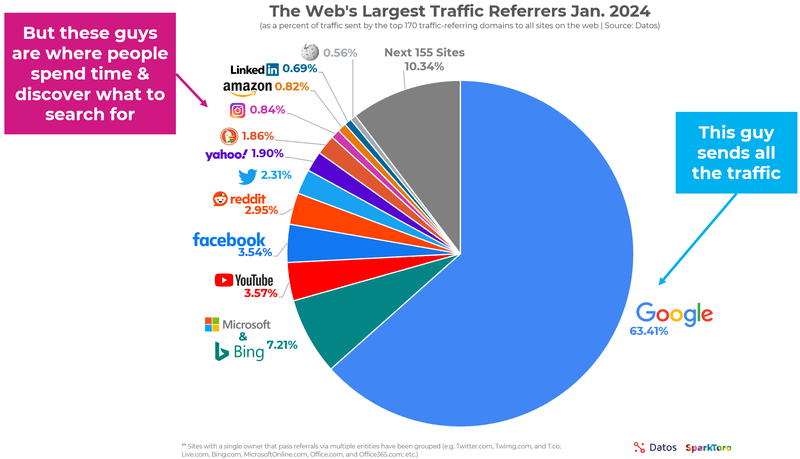As an SEO company for the last 25+ years, we’re hyper aware that the digital landscape is constantly evolving. As you optimize your site for search engines, you need up-to-date information on how visitors are using search engines, current trends, and where to focus your search engine optimization (SEO) efforts.
On this page, we’ll provide the ultimate guide to 2025 search engine facts and statistics so that you can optimize your SEO campaign accordingly.
28 search engine statistics you need to know
Below, we’ll break down our list of statistics into the following categories:
- Search engine market share
- Search engine user statistics
- Search engine use stats
- Search engine marketing facts
- AI-powered search engine statistics
Search engine market share
Know who the front-runners are when it comes to search engines, like Google and Bing. The last thing you want to do is prioritize the wrong search engine when building your SEO strategy!
Google holds 83% of the desktop search engine market share worldwide. (source)
The runners-up are alternative search engines: Bing, with 9% of the market share, Yahoo!, with 3%, and Yandex, with 2%.

Google holds a whopping 95% of the mobile search engine market share worldwide. (source)
If you thought Google dominated the desktop market share, consider how firm of a grasp they have on the mobile market share.

When establishing your SEO strategy, you’ll most often want to prioritize Google.
Search engine user statistics
Exactly how many people use search engines, though?
Over a billion people use Google. (source)

2 trillion searches are run on Google every year. (source)
That’s 70,000 searches every second or 5.8 billion per day.
Search engines drive 68% of all website traffic. (source)
Which means you’ll want to rank on the first page of Google for your most valuable search terms (or keywords).
Google itself sends 63.41% of all website traffic (source)

71% of B2B clients use search engines for product research. (source)
If you’re in the business-to-business (B2B) sector, consider using this search engine statistic to get buy-in from leadership to invest in SEO.
Nearly 82% of Internet users between 18 and 64 have used a search engine or web portal in the past month. (source)
That makes search engines the third most-used site or online app, after chat and messaging apps and social networks, which emphasizes the benefits of search engine optimization for businesses.
Search engine use stats
Now that you know how many people use search engines, let’s talk about how they use them.
On average, a Google search session lasts less than 1 minute. (source)
Users want to find the information they’re looking for fast, so keep that in mind when optimizing your site — if you aren’t considering the user experience, your SEO performance will likely suffer.
P.S. If user experience isn’t your strong suit, you can get professional help with SEO website design services.
A user conducts 3-4 daily searches, on average. (source)
This user behavior is a fantastic indicator for creating long-form content that anticipates a user’s follow-up questions to their initial search — that way, users stay on your site vs. bouncing back to Google.
40% of adults use voice search daily. (source)
With the rise of voice assistants, voice search has become more prevalent, so keep it in mind while establishing your SEO strategy. Many of the best SEO companies can provide specialized assistance for this newer type of SEO.
More than 1 billion voice searches are made every month. (source)
Featured snippets supply 60% of voice search answers. (source)
Featured snippets were already lucrative search real estate, but this information makes it even more critical to try and optimize for these coveted spots.
63% of people are likely to click on a paid search ad on Google, compared to 15% on Amazon and 9% on YouTube. (source)
That’s why many businesses use SEO and pay-per-click (PPC) advertising together.
57% of search traffic is mobile. (source)
Since mobile makes up most search traffic, prioritize mobile usability when optimizing your site.
96% of mobile search traffic comes from Google. (source)
Location-related searches account for 30% of all Google mobile searches. (source)
So, consider adopting local search engine optimization, like by claiming and optimizing your Google Business Profile. If you’re operating one or multiple franchise locations, consider professional help via franchise SEO services.
80% of consumers find local information using search engines. (source)
The amount of “near me” searches has increased by 500% in recent years. (source)
58% of consumers find local businesses with voice search. (source)
Over 27% of clicks go to the first Google search result. (source)
That’s why it’s critical to follow SEO best practices for ranking on Google, like:
- Ensuring Google can crawl and index your content
- Targeting keywords relevant to your target market
- Optimizing your title tags and meta descriptions with your target keyword
- Linking to your URL from other URLs on your site
- Earning reputable backlinks to your website
75% of searchers only look at the first page of search results. (source)
Increasing your organic rankings as much as possible is critical if you want to drive more traffic to your site.
Only 31,339 keywords are searched more than 100,000 times a month in the U.S. (source)
According to Ahref’s U.S. database of four billion keywords, the number of keywords with high search volume might be lower than you’d expect.
Only 0.10% of keywords have a monthly search volume between 1000 and 100,000. (source)
Search engine marketing facts
While these usage statistics are essential to know, you might be wondering, “What’s the bottom line?” How can search engines positively impact your business, and how should SEO marketers strategize accordingly?
With a 14.6% close rate, search engines close deals at a higher rate than traditional marketing. (source)
That’s why many SEO goals will go beyond rankings and traffic, and instead focus on key performance indicators (KPIs) like qualified leads and revenue.
Search helps 51% of users find a new company or product. (source)
In short, organic search can play a massive role in your customer acquisition strategy, so it’s worth paying attention to!
AI-powered search engine statistics
AI-powered search engines are on the rise following the introduction of ChatGPT. Bing, Google, and more companies have developed or are developing ways to incorporate AI into their search engines.
As the trend develops, website owners should stay abreast of the most recent updates so they can be at the forefront of any changes this might spell for SEO. Here are a few statistics to get you started:
89% of U.S. adults consider data privacy a vital feature of search engines. (source)
40% of Millennials would use an AI-powered search engine. (source)
Only 27% of U.S. adults would trust an AI-powered search engine to deliver unbiased search results. (source)
Learn more: What is the future of search engines?
Know the search engine facts to keep your SEO up to date
As the world of search changes rapidly, SEO marketers need to stay updated on the latest facts and statistics. The better informed you are, the more strategic your SEO approach can be.
For more tips on how to respond to some of these recent search engine developments, browse the rest of our blog!

Future-Proof Your SEO Strategy with OmniSEO™
Goodbye search engine optimization, hello search everywhere optimization.



Future-Proof Your SEO Strategy with OmniSEO™
Goodbye search engine optimization, hello search everywhere optimization.

Future-Proof Your SEO Strategy with OmniSEO™
Goodbye search engine optimization, hello search everywhere optimization.
Writers



